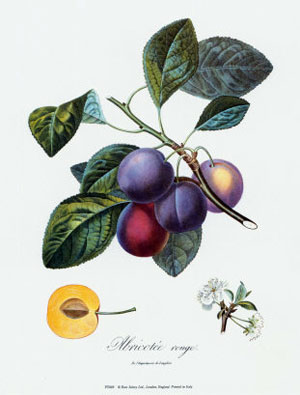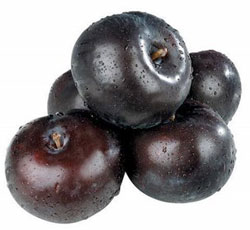
How in this sweet
aftermath of everything the mind
should settle on plums
Geri Doran
“Blue Plums”
If poetry is all about the image, then it’s understandable why so many poets have written about food. Writing about food is like writing about a lover. The poet can—and does, joyously—explore all the senses. In “I Chop Some Parsley While Listening to Art Blakey’s Version of ‘Three Blind Mice,’” Billy Collins raises dicing herbs and vegetables while listening to jazz to a whole new level of food prep. Last semester, a student’s poem about warm pita and honey inspired my class to have a party where we drank tea and prepared and ate the subject of her poem.
Of all the food groups, however, it is fruit that has inspired the greatest outpouring. What better object to evoke sensations of sweetness and succulence? What better metaphor for the body? What better metaphor for the pleasures of poetry itself? Diane Wakoski’s “Ode to a Lebanese Crock of Olives,” one of her many food poems and a veritable cornucopia of shimmering ingredients, spills over to include “the gold of lemons” and “the still life of grapes.” In “A Step Away From Them,’ Frank O’Hara’s lunch includes “a glass of papaya juice.” That’s the “lunch poem” that ends with the lines “My heart is in my / pocket, it is Poems by Pierre Reverdy,”
 One of my favorite fruit poems is William Carlos Williams’s “This Is Just to Say,” in which the speaker asks for forgiveness for eating the plums that his wife was saving for the next day. As someone—possibly a Williams critic or possibly my husband—once pointed out, asking someone to forgive you isn’t quite the same thing as actually saying “I’m sorry,” and by the third short stanza the speaker is swept away once again by just the memory of those wonderful plums: “they were delicious, / so sweet / and so cold.” And we are swept away as well.
One of my favorite fruit poems is William Carlos Williams’s “This Is Just to Say,” in which the speaker asks for forgiveness for eating the plums that his wife was saving for the next day. As someone—possibly a Williams critic or possibly my husband—once pointed out, asking someone to forgive you isn’t quite the same thing as actually saying “I’m sorry,” and by the third short stanza the speaker is swept away once again by just the memory of those wonderful plums: “they were delicious, / so sweet / and so cold.” And we are swept away as well.
Williams returned to the subject in a poem far more serious in tone, “To a Poor Old Woman”: “Comforted / a solace of plums” (that second line may be one of the best lines ever written about plums—or any other subject). Another Modernist, Wallace Stevens, also served up fruit in a number of poems, including “Sunday Morning” (oranges), “Study of Two Pears,” and “A Dish of Peaches in Russia”: “With my whole body I taste these peaches, / I touch them and smell them.”
 For sheer exuberance, perhaps nothing matches the spirit of Galway Kinnell’s “Blackberry Eating,” in which the speaker goes out to pick blackberries and ends up celebrating both the act of eating the fruit and the act of writing about fruit. The poem begins on a high note with “I love to go out in late September / among the fat, overripe, icy, black blackberries” and just keeps building from there, to “squeeze, squinch open, and splurge well” to “the silent, startled, icy black language / of blackberry-eating.” Other poems about berries include Irving Layton’s “Berry Picking,” Stanley Plumly’s “Woman on Twenty-Second Eating Berries,” Sylvia Plath’s dark “Blackberrying,” and Claudia Rankine’s rapturous “The Man. His Bowl. His Raspberries.”
For sheer exuberance, perhaps nothing matches the spirit of Galway Kinnell’s “Blackberry Eating,” in which the speaker goes out to pick blackberries and ends up celebrating both the act of eating the fruit and the act of writing about fruit. The poem begins on a high note with “I love to go out in late September / among the fat, overripe, icy, black blackberries” and just keeps building from there, to “squeeze, squinch open, and splurge well” to “the silent, startled, icy black language / of blackberry-eating.” Other poems about berries include Irving Layton’s “Berry Picking,” Stanley Plumly’s “Woman on Twenty-Second Eating Berries,” Sylvia Plath’s dark “Blackberrying,” and Claudia Rankine’s rapturous “The Man. His Bowl. His Raspberries.”
And for sheer gloriousness (and sensuality), we can return once again to the plum, this time in Helen Chasin’s “The Word Plum,” which opens with “The word plum is delicious / pout and push...” and ends with “lip and tongue / of pleasure.” Reading this poem is exactly like biting into a plum; each line makes me want to stop and savor a mouthful of perfect syllables.
- Carolyn Foster Segal is an essayist and a professor of English at Cedar Crest College in Allentown, PA, where she teaches courses in creative writing and women's film.

